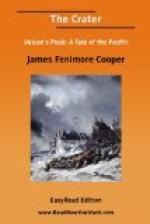But Mark Woolston had no thought of abandoning the crater and the Peak. Nor did he desire to people them at random, creating a population by any means, incorporating moral diseases in his body politic by the measures taken to bring it into existence. On the contrary, it was his wish, rather, to procure just as much force as might be necessary to security, so divided in pursuits and qualities as to conduce to comfort and civilization, and then to trust to the natural increase for the growth that might be desirable in the end. Such a policy evidently required caution and prudence. The reader will perceive that governor Woolston was not influenced by the spirit of trade that is now so active, preferring happiness to wealth, and morals to power.
Among Woolston’s acquaintances, there was a young man of about his own age, of the name of Pennock, who struck him as a person admirably suited for his purposes. This Pennock had married very young, and was already the father of three children. He began to feel the pressure of society, for he was poor. He was an excellent farmer, accustomed to toil, while he was also well educated, having been intended for one of the professions. To Pennock Mark told his story, exhibited his proofs, and laid bare his whole policy, under a pledge of secresy, offering at the same time to receive his friend, his wife, children, and two unmarried sisters, into the colony. After taking time to reflect and to consult, Pennock accepted the offer as frankly as it had been made. From this time John Pennock relieved the governor, in a great measure, of the duly of selecting the remaining emigrants, taking that office on himself. This allowed Mark to attend to his purchases, and to getting the ship ready for sea. Two of his own brothers, however, expressed a wish to join the new community, and Charles and Abraham Woolston were received in the colony lists. Half-a-dozen more were admitted, by means of direct application to the governor himself, though the accessions were principally obtained through the negotiations and measures of Pennock. All was done with great secrecy, it being Mark’s anxious desire, on many accounts, not to attract public attention to his colony.




